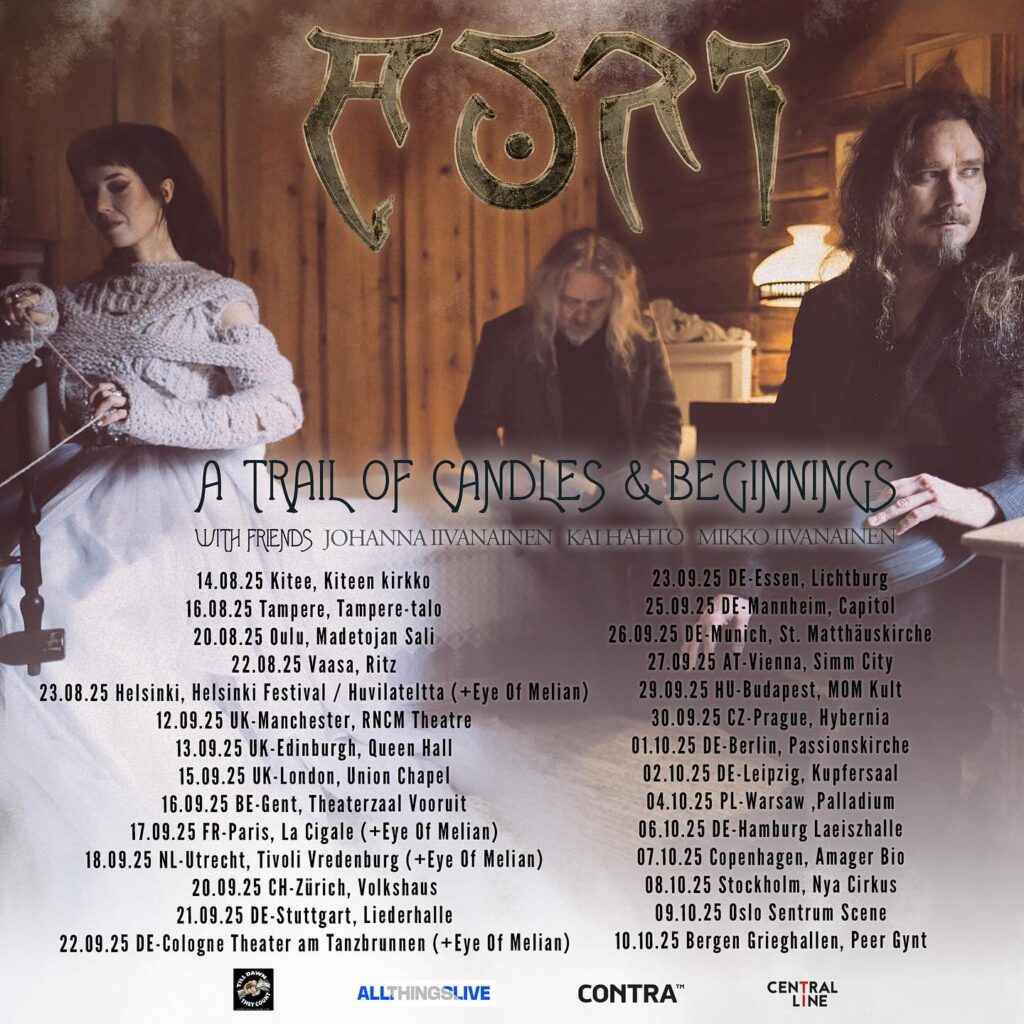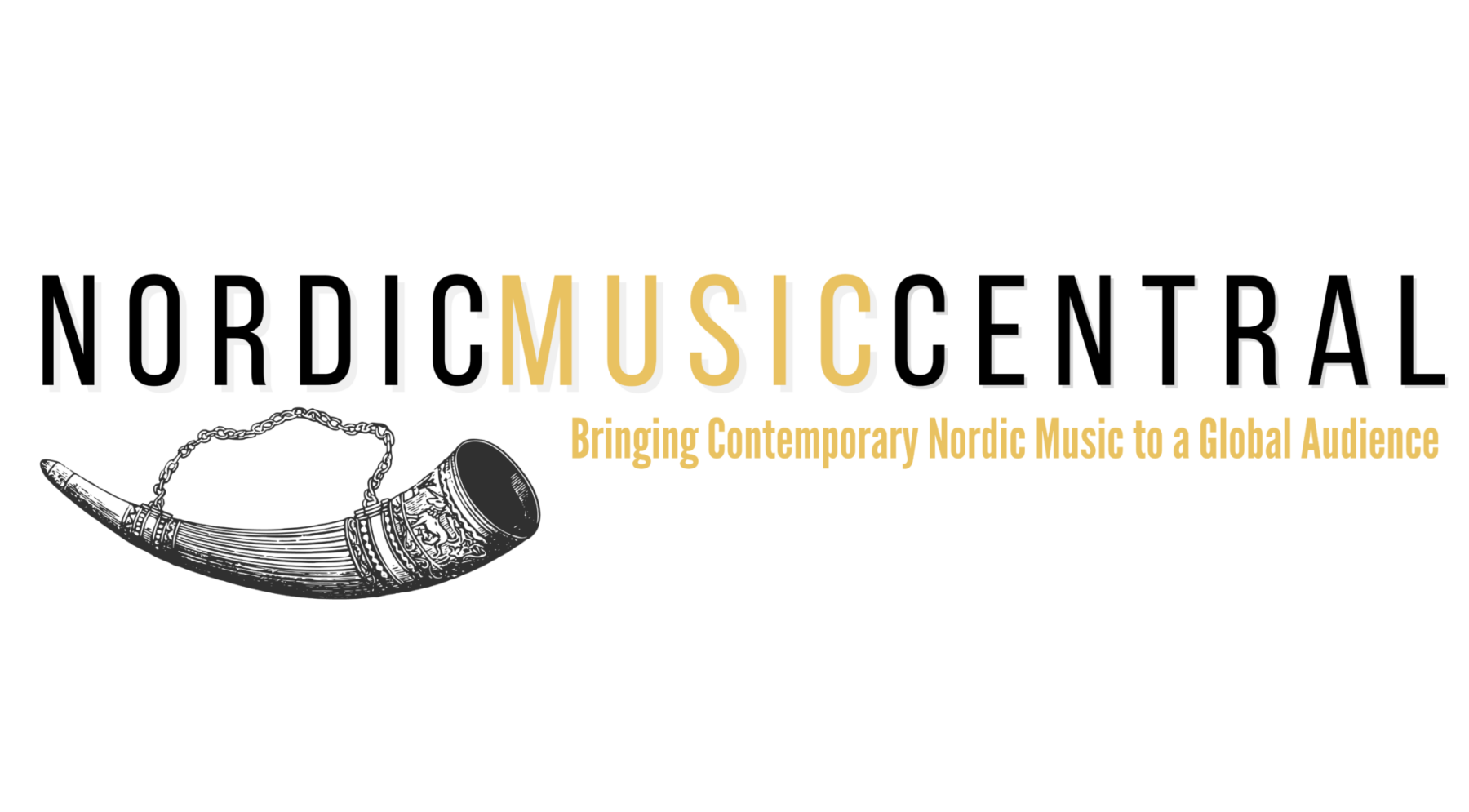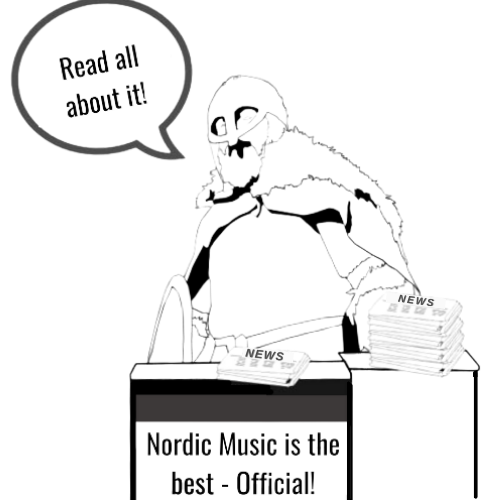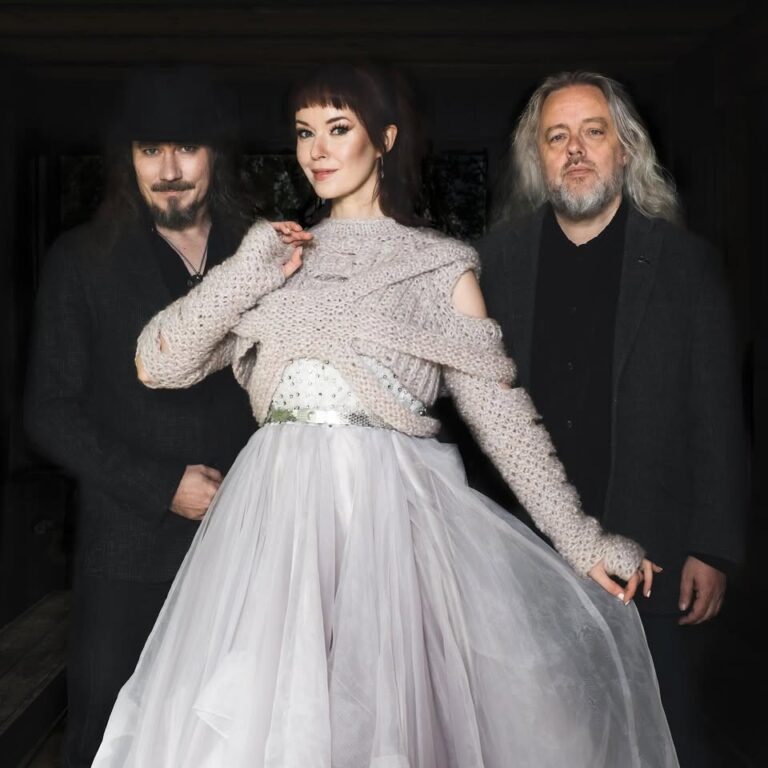Auri has just released its third album, four years after the previous one at the height of the pandemic and 14 years after coming together with an idea for what has turned out over time to be a ‘folk-prog’ band.
‘III – Candles and Beginnings’ has been widely hyped, more so than previous albums and the fact that symphonic metal outfit Nightwish is on extended hiatus following the release of the ’Yesterwynde’ album last September must have played a part in that. Nightwish’s members have the time on their hands they previously coveted but never managed to find.
Two of the full time members of that band are founders and mainstays in Auri – Tuomas Holopainen and Troy Donockley, while its drummer Kai Hahto contributed the percussion on ‘III – Candles and Beginnings’. The third member is Tuomas’ wife Johann Kurkela, a solo artist and also collaborator with bands such as Eye of Melian.
So I can’t really avoid comparisons with Nightwish, what with half of that band’s roster at work here but I’ll try to minimise it. Auri isn’t a side project of Nightwish, nor is it an off-shoot, as some insist on describing it. It is quite different, and, who knows, might even replace it in the long run.
Interestingly they are quick to point out that the Auri project has permitted them to express themselves in ways that other projects do not. Tuomas is at pains to stress that he “loves both bands dearly” but that Auri avoids the “drama of the history” of Nightwish, something that enables all three members of Auri to feel more peaceful. Make of that what you will.
I couldn’t help but notice that there have already been several album reviews in metal and heavy rock magazines, which is like me writing about artists from Estonia, because this isn’t metal. Or is it? We shall see.
I did a little research on what the band members themselves think the songs could be about (I stress ‘could’ – the general rule in Auri is that they do not give too much away) and have intertwined that with my own take.
The opening track ‘The invisible Gossamer Bridge’ goes some way to describing the connection they share. They work in isolation then unite through a ‘gossamer bridge’ between northern England and Finland but one which is known only to them.
The multi-tracked Johanna Kurkela sounds like she is spinning that bridge in front of your very senses. It is evident immediately that she has the ability to produce both ethereal and gentle vocals at the same time; an unusual combination.
And her pitch is somewhere between that of Floor Jansen (think of the Nightwish song ‘Something whispered follow me’) and Cocteau Twins’ Elizabeth Fraser, or Enya.
From the siren-like opening call to the flute lament that plays it out it is a quite beautiful way to get the album underway.
‘The Apparition Speaks’ sounds like a séance at first and concerns the struggle to hear a message coming through because of the external ‘noise’ (a subject the Nightwishers are familiar with) but they remain ambiguous beyond that other than saying that there are clues in the arrangement, the lyrics and the way it is sung.
Another Auri comment made reference to “making contact with something ‘out there’”.
That got me thinking about the Jodie Foster film ‘Contact’ which is about us doing just that with an alien intelligence but there is nothing evident in the lyrics to support that theory. So I’ll leave it to your imagination.
Musically it re-writes the meaning of ethereal in the intro then changes into a prog rocker – chunky guitar ‘n all – then a peripheral Nightwish song (of the 2020s, not before) and I’m confident Tuomas was the writer here.
I will have language
It isn’t about finding an identity. To Troy Donockley it means being inspired by the mechanism of birth and its stages – the sections embrace the embryonic (I would argue it is the conception?), the fetal, the run up to birth and final chord is the birth itself. And so the lyrics are from the POV of the unborn child.
It is mystical, slightly eerie, with at times overwhelming synthesisation and the heavenly multi-tracked voices of Johanna Kurkela and others sounds like Carols from Kings at Christmas. Auri is risen.
Then the jungle drums come in a la the Nightwish track ‘Music’ leading to a potent ending which could have been even mightier still given what it signifies.
This is a very powerful track for many reasons. I’ll content myself with one. How many songs have you heard that are dedicated to the concept of birth and which are not Christmas Carols? Actually there are a fair few but not many you will be aware of, the most famous perhaps being Ed Sheeran’s ‘Small Bump’.
It can be a tricky subject in societies in which abortion rights seem to have taken precedence over birth rights with terminations permitted literally up to the last minute.
So it is actually quite brave to write a song that could be interpreted as being ‘pro birth’ even if that was not the intention.
Oh, Lovely Oddities
This endearing little song attracts because it doesn’t directly relate to personality traits but rather to some people that band members know from a particular location they love to visit. That will resonate with most people. We all like to be amused by such things, confident in the ‘knowledge’ that we are normal.
I can think of a few possible locations around the north of England if that is the setting but it could equally be in Kitee, the band’s HQ, or somewhere else in Finland, or anywhere.
References to the Milky Way, emmer wheat, chanterelles, amrita, and pints of ale point me for various reasons to obscure hippy/new age hangouts, again possibly in parts of Northern England.
They do run the risk here of kick-starting a location finding exercise like that of Kit Williams, the British author who had most of the country trying to discover where a golden hare, encrusted with jewels, was buried, following clues in his book Masquerade, in 1979.
The strongly melodic song is delivered in a chirpy, cheery, storytelling manner that will have you enchanted and is punctuated by a stylish violin bridge from Johanna.
If the previous track was chirpy, ‘Libraries of Love’ is more maudlin although never depressing. It follows a path similar to that of Nightwish’s ‘Lanternlight’ (and, a side note here, the live stage has been filled with them in the opening shows of their tour, see below).
My immediate reaction was that it signifies a dual mortality out of which the deceased continue to flourish through the roots of the trees by which they used to walk. That seems a little abstract to say the least and I would like to get to the bottom of it.
It is more in the way of an old fashioned, traditional folk song complemented by terrific harmonising by Johanna Kurkela with herself.
‘Blakey Ridge’ is an ode to a popular but very isolated pub, The Lion Inn, in the wilds of North Yorkshire which probably has few ‘locals’ but many long distance visitors (and even more now, Auri should be on 10% of the pub’s additional takings and those of Theakston’s Brewery).
One of them is multi-instrumentalist Troy Donockley who resides in that part of the world, augmented by other members of Auri when they are on a writing expedition in England. Indeed it was the first place they ever played together live.
It’s flute over a piano melody that might belong to a TV cop drama with a pipes jig thrown in.
At the end it turns into an unashamed advert for the place.
“I’m letting go of yesterday/ The last of me is here to stay/I’ll see you up at Blakey Ridge”.
It had better be this good if I’m going to risk corpsing my old jalopy to get there. And I’ll have a pint of Theakston’s Old Peculier when you’re ready bartender.
Helios generally refers to the ancient Greek god of the Sun and this song is indeed a hymn to that Sun, without which there is no life here.
But there is more complexity to be read in the lyrics. “You are millions and you are one” seems to be a generalised plea for unity that could be applied anywhere as well as being an observation on the Sun’s place in the universe.
And it sounds more Scottish – or at least Gaelic – than Greek here, courtesy of some entrancing pipes, and then switches into a Middle Eastern motif.
There are plenty of succulent strings and a vocal that could be a lullaby performed latterly against the background of a full orchestra and choir. You’d never believe just four people were responsible for this.
‘Museum of Childhood’ is one of the tracks we already reviewed as a single. It is taken from Johanna’s childhood memories and triggered by seeing signs for a Museum of Childhood that she did not enter but could not forget.
Her conclusions were that we are experiencing life as in a video game, which of course is a philosophy that is highly prevalent right now and plastered all over the Internet – that at we are living in a simulation.
My interpretation was a little different, that the song is an exhortation to enjoy life while you are still young because it lasts no more than a fleeting moment in the overall scheme of things.
As ever the music is quite sumptuous. Auri have become the masters of the long, slow build up to overwhelming anthemic outros. This one extends, evolves and intensifies as if a child is being introduced to its time on Earth by way of an induction through the museum as to what it can hope to experience if all goes according to plan even if that rarely happens in practice.
There is much going on from a plethora of instrumentation but what caught my attention was a simple four note arpeggiated (I think – I’m not a muso) piano riff that comes in at around 3:25 and which you will not be able easily to get out of your mind.
The entire production, including the video that goes with it, has the same sort of power as Nightwish’s ‘Ad Astra’ and that is about as complementary as it is possible to be.
Another track we reviewed as a single is ‘Shieldmaiden’.
Tuomas on his own admission loves archetypal figures and his work is full of them – Valkyries, devils, elves, trolls, wizards, mermaids, you name it.
A shield-maiden was a female warrior from Scandinavian folklore and mythology. The term is also used in modern English as synonymous with Valkyrie. A very metal concept. Sometimes there’s no getting away from it.
But here the song is as much about perseverance, facing challenges and overcoming them and each band member has their own interpretation, which can be of someone close to them.
Interestingly, Tuomas has revealed that it was written after a drinking ‘session’, which brought out the best in him.
It bears some similarity with the song ‘Pearl Diving’, from the 2021 album ‘Those we don’t speak of’ by which I mean how lighter synthesiser chords grow in intensity later, the slow build up via a planned trajectory to a commanding anthemic ending, the late arrival of piercing guitar and Johanna’s vocal delivery of short, staccato lines that are spoken as much as sung.
And so the final track, A Boy travelling with his mother, a mysterious 11-minute journey in which parent and child are travelling on a train.
But who are they and where are they going? Is it a trip to the seaside or a Nazi Death Train on a one-way journey?
It is riddled with ambiguity.
They are having a profound experience together but what is that experience? Again, it is open to the listener’s interpretation and mine might be of a wartime evacuation.
But the lyrics are tantalisingly sparse.
The song has a down to Earth title that could be of an L S Lowry painting in its starkness. The composition in contrast is of highly atmospheric synthesisers with a distinctly 1970s prog aura – I’m thinking particularly of Genesis and Yes – together with the incomplete lyrics and various noises off.
Bluntly, it’s a masterpiece – arguably Auri’s ‘Ghost Love Score’ – and I can think of musicians across the world, including those still remaining from the 70s who would pay whatever it took to see this performed live although sadly I doubt that it will be, at least not in the immediate future.
So, what do we have?
A piece of tour-de-force folk-prog with as much variety as you want. Plenty of melody and deep, meaningful lyrics you can mull over to your heart’s content while you sip your pint at the Lion Inn.
There is sorrow and happiness, delight and despair, a little bit of metal perhaps, most of it in ‘The Apparition Speaks’ and ‘Shieldmaiden’ and a monumental track to close.
You can’t really count it as a concept album because each song has a context of its own to be unraveled.
Musically the standard is exactly what you would expect from artists of their calibre and vocally Johanna Kurkela delights with every line.
There were a couple of occasions when I wished she could mix things up a bit, perhaps throw in some vibrato or a death metal growl but that would just sound silly.
I have no hesitation in awarding this album a score of 9/10.
Auri are currently touring, for the first time ever. As I write they have played three shows in Finland with another three to follow, starting on 20th August in Oulu.
Then, after a break, they come to the UK for three shows, starting on September 12th at Manchester.
The full tour schedule is here:

The four musicians previously mentioned are augmented by Johanna Livanainen (keys and backing vocals) and Mikko Livanainen (guitars).
They did promise some surprises (I was expecting possibly one Nightwish cover) but I don’t see quite what they are except that, intriguingly, there are only four songs from this album on the 18/19 long setlist.
Find them on:
Facebook: https://www.facebook.com/AURlband
Instagram: https://www.instagram.com/auri.band/



